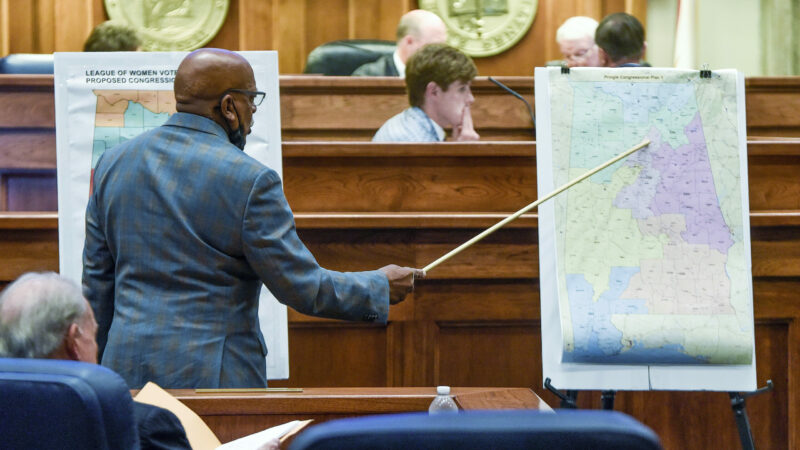EXPLAINER: How Alabama congressional map got to high court
Sen. Rodger Smitherman compares U.S. Representative district maps during a special session on redistricting at the Alabama Statehouse in Montgomery, Ala., Nov. 3, 2021.
By MARK SHERMAN and JESSICA GRESKO, Associated Press
WASHINGTON (AP) — A divided Supreme Court is allowing Alabama to use re-drawn congressional districts for the 2022 elections that a lower court found had improperly diluted the votes of Black residents. The high court’s action Monday is a win for Republicans and sets the stage for a potentially major decision next year about race and redistricting that could affect minority political representation across the country.
Once-a-decade redistricting
Like every other state with more than one congressional district, Alabama redrew its congressional district map based on the results of the 2020 census. The Republican-dominated legislature drew six districts with white majorities and one with a Black majority. The state’s population is about 63% white and 27% Black. The map is expected to retain the state’s partisan breakdown in the House of Representatives: six Republicans and one Democrat.
Map challenged in court
Alabama residents represented by voting rights lawyers went to federal court, asserting that lawmakers should have better reflected the state’s population by drawing a second district where Black voters could shape the outcome. They argued that the federal Voting Rights Act requires the drawing of districts in which minorities can elect their preferred candidates when voting is racially polarized, as it is in Alabama, and Black voters make up a large, but still geographically compact group. A second district would enhance Black political power in a state where Jim Crow once held sway and also likely result in the election of a second Democrat.
Lower court rules for challengers
Most voting rights cases are heard by a three-judge court under a provision of the Voting Rights Act, the landmark 1965 legislation that overcame determined resistance and opened the ballot box to Black Americans, mainly in Southern states. Later revisions expanded the law’s reach to cover Hispanic and Native American voters in various parts of the country who had encountered systemic obstacles to voting.
In this case, a panel consisting of two appointees of former President Donald Trump and a third judge who was made a federal appeals court judge by former President Bill Clinton ruled unanimously that the Alabama map likely violated the Voting Rights Act by diluting Black voting strength and ordered the drawing of a second district with a Black majority, or close to it.
Qualifying for the congressional races had been scheduled to end Jan. 28. The judges pushed that back until Feb. 11 and gave lawmakers two weeks to produce a new map. The lower court said it would hire experts to draw a new map if the legislature didn’t act by Monday.
Alabama appeals
The state quickly turned to the Supreme Court, contending that its map does not violate the law. Alabama argued that its map was remarkably similar to maps used previously in the state while the three-judge court’s ruling would require radically new districts to be drawn just days ahead of the candidate qualifying deadline. The state said the lower court’s ruling improperly prioritized race in the drawing of districts over race-neutral principles.
More than a dozen mostly Republican-led states backed Alabama’s appeal.
What did the supreme court decide Monday?
The court only allowed the congressional map drawn by the Alabama legislature to be used for the 2022 election, putting off any final decision about whether it violates the Voting Rights Act until next year. But the ideological split on the court suggests that the case could produce a major ruling on the voting rights of Black Americans and other political minorities. The case won’t be argued before the fall, with a decision expected by late June 2023.
Conservative justices have weakened the Voting Rights Act
Since 2013, conservative court majorities have weakened the Voting Rights Act. In a case that also came from Alabama, the court by a 5-4 vote ended the law’s requirement, embodied in its Section 5, that state and local governments with a history of discrimination in voting obtain approval in advance, either from the Justice Department or a federal court in Washington, D.C., of any election-related changes.
Last year, by a 6-3 vote, the court raised the bar for proving racial discrimination, under the law’s Section 2, in cases of alleged suppression of votes.
This case involves cases in which plaintiffs claim state and local governments are unfairly reducing, or diluting, the voting strength of minorities.
Pentagon shifts toward maintaining ties to Scouting
Months after NPR reported on the Pentagon's efforts to sever ties with Scouting America, efforts to maintain the partnership have new momentum
Why farmers in California are backing a giant solar farm
Many farmers have had to fallow land as a state law comes into effect limiting their access to water. There's now a push to develop some of that land… into solar farms.
Every business wants your review. What’s with the feedback frenzy?
Customers want to read reviews and businesses need reviews to attract customers. But the constant demand for reviews could be creating a feedback backlash, experts say.
‘Get back to integrity’: Oklahoma’s Kevin Stitt on Republicans after Trump
NPR's Steve Inskeep asks Oklahoma Gov. Kevin Stitt about his spat with President Trump, immigration and the future of the Republican Party.
Civil rights leaders say the racial progress Jesse Jackson fought for is under threat
Activists say racial progress won by the Rev. Jesse Jackson is under threat, as a new generation of leaders works to preserve hard-fought civil rights gains.
Tariffs cost American shoppers. They’re unlikely to get that money back
After the Supreme Court declared the emergency tariffs illegal, the refund process will be messy and will go to businesses first.






